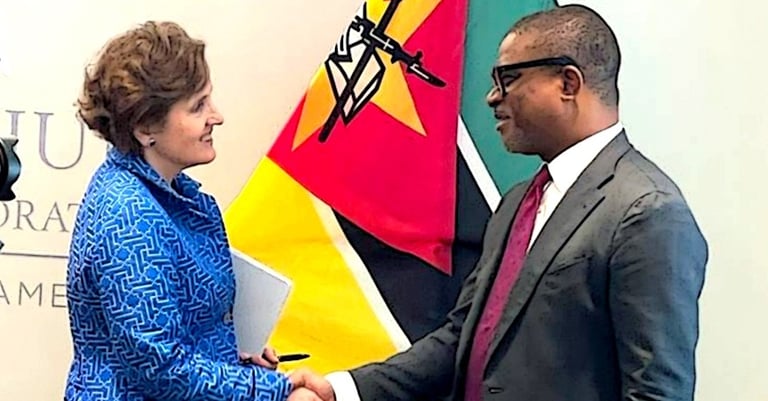Mozambique’s $500M US-Funded Bridge and Ring Road Project to Begin in 2026
$500M US-funded MCC project will start building a 1,800m Licungo River bridge and 16km Mocuba ring road in Zambézia, Mozambique. Announced by President Chapo, it aims to boost connectivity, resilience, and sustainable development.
NATIONAL ROADS AND MAINTENANCELOGISTICS
Phillemon Neluvhalani
7/29/20253 min read


Construction of a bridge and ring road in central Mozambique, two flagship projects within a $500 million initiative funded by the United States government, will commence in 2026, Mozambican President Daniel Chapo announced.
“We also came here to Mocuba to discuss what we are going to do. We haven’t forgotten what we promised here in Mocuba during the election campaign. That’s why we came here to say: The bridge over the Licungo River and the Mocuba ring road will begin next year,” Chapo declared during a three-day visit to Zambézia province, which concluded on Friday. The visit underscored the government’s commitment to infrastructure development in one of Mozambique’s most strategically important regions, which is prone to natural disasters and serves as a critical economic hub.
The Millennium Challenge Account (MCA) in Mozambique, tasked with overseeing the project, had previously announced plans to launch a tender for the construction of the new bridge over the Licungo River and the Mocuba ring road early in 2025, according to a December 2024 report by Lusa. The MCA intended to issue a “Specific Tender Announcement” and release related documents by the end of January 2025, setting the stage for the project’s implementation. The estimated cost for the bridge and ring road is $200 million, a significant portion of the broader funding package.
The project entails constructing an 1,800-meter bridge approximately half a kilometer downstream from the existing crossing, alongside a 16-kilometer ring road to connect to South Africa's N1 highway, Mozambique’s primary north-south artery. The current Licungo River bridge, built in the 1940s, is outdated, heavily congested, and ill-equipped to handle modern traffic demands. It has been damaged by floods on at least two occasions, exacerbating transportation challenges during natural disasters. The absence of viable alternative routes for heavy vehicles during such disruptions underscores the urgency of the new infrastructure, which is designed to enhance resilience and ensure reliable connectivity.
Zambézia province, Mozambique’s second most populous region, is renowned for its tea plantations, lush mangroves, and pristine turquoise beaches. However, its coastal location makes it highly vulnerable to cyclones and flooding, which have repeatedly disrupted economic activity and infrastructure. The $500 million (approximately €425.6 million) project, funded by the US-based Millennium Challenge Corporation (MCC) with an additional $37.5 million (€31.9 million) contribution from the Mozambican government, aims to address these challenges. Known as Compact II and signed on September 20, 2023, at the US Capitol in Washington in the presence of then-President Filipe Nyusi, this agreement marks the second MCC compact with Mozambique since 2007.
The Mozambique Coastal Connectivity and Resilience Compact focuses on three key areas: improving rural transportation networks, promoting commercial agriculture through policy and fiscal reforms, and enhancing coastal livelihoods through climate resilience initiatives. Of the total funding, $310.5 million (€263.9 million) is allocated to Rural Transport and Connectivity (RTC) projects, with $201 million (€171.1 million) specifically dedicated to the Licungo River bridge and Mocuba ring road. An additional $83.5 million (€71 million) will support rural road construction, and $11 million (€9.3 million) is earmarked for road maintenance to ensure long-term sustainability. These investments aim to improve access to markets, reduce transportation costs, and bolster economic resilience in Zambézia’s rural communities.
The Agricultural Project Reforms and Investment (PRIA) component, valued at $30 million (€25.5 million), is split evenly between the Agricultural Investment Taxation Reform package and the establishment of the Zambézia Province Commercial Aggregation Platform. These initiatives seek to streamline agricultural policies, attract private investment, and enhance the province’s agricultural value chains, particularly for crops like tea, maize, and soybeans, which are vital to the local economy.
The third component, Coastal Livelihoods and Climate Resilience (CLCR), allocates $100 million (€85.1 million) to strengthen economic productivity through sustainable fishing, shellfish harvesting, and non-extractive coastal activities such as eco-tourism. This focus is critical in Zambézia, where coastal communities face increasing threats from climate change, including rising sea levels and intensified cyclones. By integrating climate-smart practices, the CLCR aims to protect livelihoods while fostering economic diversification.
The MCC, a US government foreign aid agency, provides grants to developing countries to promote economic growth and poverty reduction. Mozambique’s selection for Compact II reflects its progress in governance and economic reforms, as well as its strategic importance in the region. The new bridge and ring road are expected to reduce travel times, lower logistics costs, and improve access to markets for Zambézia’s agricultural and fishing communities, while also enhancing the province’s resilience to climate-related disruptions. With construction set to begin in 2026, the projects mark a significant step toward modernizing Mozambique’s infrastructure and fostering sustainable development in one of its most dynamic regions.
Future
© 2025. All rights reserved.


